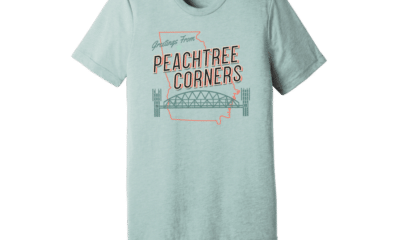Business
Capitalist Sage: Creating A Solid Foundation in the Beauty Industry [Podcast]
Published
6 years agoon
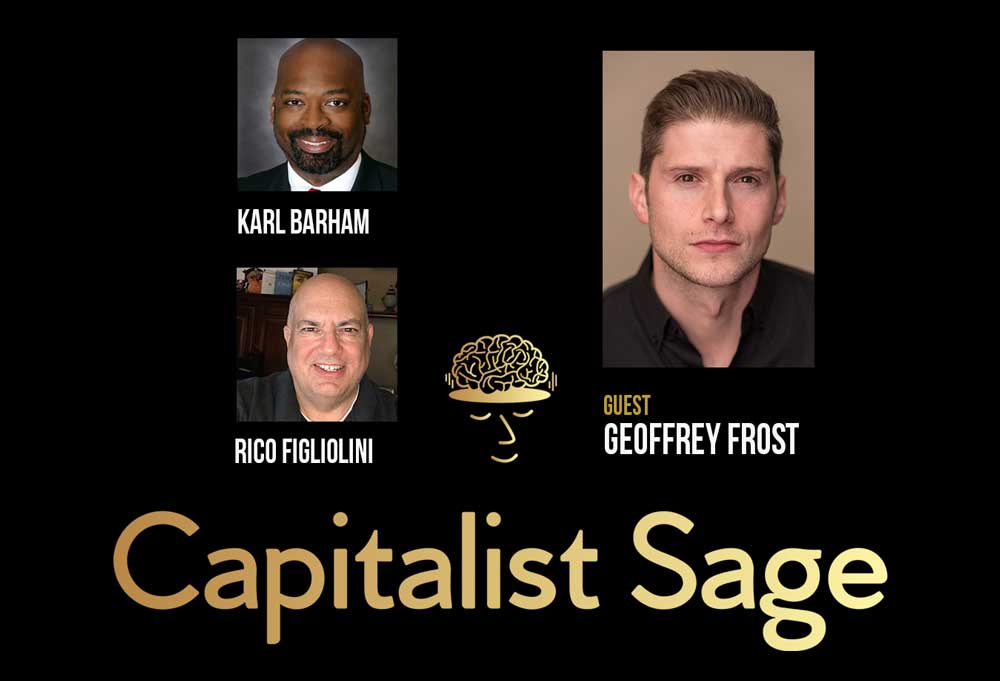
Working and owning a Beauty Industry Business has its challenges and its own ups and downs. Geoffrey Frost, our guest on today’s episode of the Capitalist Sage, has gained wisdom through his experience in this trade. Join Karl and Rico as they chat with Geoffrey about what it takes to have a good team, manage your business, and ultimately keep your clients happy.’
Resources:
Frost Salon
(770) 680-4549
FrostSalon@gmail.com
Social Media
Instagram: Frost.Salon
Facebook: https://www.facebook.com/frosthairsalon/
“I’ve heard this before for many people and it’s really true. Culture in a business happens in any work environment whether you like it or not. So you better take an active role in shaping that culture otherwise, you know, your culture could be defined by disgruntled employees in your back room.
So you just have to be really mindful of that. We knew obviously there’s all the logistics of contracting and financing, and certainly we’ll talk more about that. But we knew we’d have to build a solid team where everybody’s got a nice shared vision together and you’re all working to a common goal.”
Geoffrey Frost
Karl: [1:11] Welcome to the Capitalist Sage Podcast. We’re here to bring you advice and tips from seasoned pros and experts to help you improve your business. I’m Karl Barham with TransWorld Business Advisors. And my co-host is Rico Figliolini with Mighty Rockets Digital Marketing and the publisher of the Peachtree Corners Magazine. How’re you doing today Rico?
Rico: [1:30] Hey Karl great week. This is a good time to be podcasting.
Karl: [1:33] Oh, absolutely. Lots of fun things happening. Why don’t we start off by introducing some of our sponsors today?
Rico: [1:40] Sure. I want to let everyone know where we are first. We are at Atlanta Tech Park in Tech Park. in the city of Peachtree Corners. It’s a great space that you can come to. If you’ a midsize or its startup company or a company going through the acceleration phase. Robin Beinfait who started this company, this place actually, is a workshare place with a lot of bells and whistles including being able to meet venture capitalists learn from other startups and such and also for those people that want to come here and use the space as event space, also. This is a great place for that. So let’s take part. This is their podcast studio I want to thank them for that.
Karl: [2:23] Absolutely. Just a couple cool events that are that are coming up. Asian Film Festival is starting off on October 11. They’re also going to have several events in November that’s also coming up on the schedule. Look forward to North Atlanta Technology showcase and a couple other cool events. Check out their website if you want to see some of the events that’s happening at Atlanta Tech Park. The North Atlanta Tech showcase going to be on November 14th, actually. So another place to see the new technology companies that are happening here.
Rico: [2:59] It’s amazing how this place has been used, the Atlanta Asian film festival is the largest in the Southeast that’s being done. It’s going down right here. Our next sponsor is Gwinnett Medical Center they’ve just opened up about three-four months ago and they have opened the GMC Primary Care and Specialty Center so you can go there and see a primary care doctor and also get your mammography done and your X-ray done right on site and recently Northside Hospital just bought them up. So they’re part of that hospital system as well there. And they’re on Peachtree Parkway, you can find more information at Gwinnett MedicalCenter.org/ptc
Karl: [3:43] Fabulous. Well, I’d like to introduce today’s guest; Geoffrey Frost who is owner and stylist of Frost Salon located right here locally and Peachtree Corners inside of the Ingle’s Shopping Plaza. So if you ever go by Ingles, you could see the salon there. We’re going to talk today about growing and starting a small Salon Beauty business in particular. Just learn some insights around that. How are you doing today Geoffrey?
Geoffrey: [4:12] Doing great. Thanks for having me.
Karl: [4:13] Oh, thank you for coming and joining us. A lot of times, people talk about large technology business and so on but people would be surprised to know that one of the biggest industries, especially when it comes to small businesses, are in Beauty care. Whether it’s hair salons, nails, eyebrows, waxing. It’s one of the largest segments of the market especially dominated by small businesses. We thought it’d be great to talk a little bit about what it’s like to start up a business like that and some of those things. But why don’t we start off with you introducing yourself to us a little bit, tell us a little bit about yourself.
Geoffrey: [4:50] So I’m originally from Atlanta, Georgia. I was born and raised here. One of the natives. Yeah, how many Georgia peaches are around here. Everybody’s a transplant it seems. But yeah having lived here my whole life watching the city just blossom and grow and get bigger and bigger. I met my wife not in Atlanta, I actually met my wife we can get more into that later, but I met her in London, England and we did a long distance before she came here and together we live in Peachtree Corners. We’ve lived here since we’ve been married we’re about to celebrate our 10-year anniversary. So Jen is a very talented stylist and just an even better person and then together we have four children. We have two boys and two girls and so we’re very much ingrained in the community. Our kids are in the local elementary school. We have our younger two in the local preschool and between church and sports and just socializing and we’re definitely a family full and on the go for sure.
Karl: [5:54] And tell me a little bit about starting up your business.
Geoffrey: [6:00] Yeah. So like I said my wife and I met through the hair industry, so I used to work as an educator for a hair product company and to give you a little more background, my father was a hairdresser. He owns a salon. His salon is in Dunwoody and I used to work with him for years before we opened our salon here in Peachtree Corners. But doing education for a hair product company and what that entails is going to trade shows or even in Salon classes and sharing inspiration, whether it be hair cutting, hair color and just kind of keeping your finger on the pulse of what are the new trends and what are the foundational principles that always need to be hammered home. But through that process it was interesting. I got a chance to go into some really cool salons, you know some not so cool salons. So you get a chance to see some really nice working environments and you can, you know start to sow that seed. What kind of salon would I want to have when the time comes to do it? But obviously I gained an incredible amount of confidence being able to share that vision, that dream with my wife, so it’s not just on my shoulders it’s on hers. So it’s nice if you’re an entrepreneur to have somebody really close you can trust.
Karl: [7:12] Absolutely. I know when couples are in the same industry, they can understand and empathize with you know, things that are going on at work and so on and going on with the business, so that must be a huge. How did she help you with the business?
Geoffrey: [7:28] Yeah. So we always had an idea of what we wanted to do and it’s nice to have that check and balance by somebody who really knows the industry. And so we knew how important it would be. I mean there’s the financial component of course, but we knew how important it would be if we’re going to do this because obviously you can make a great living being a hairdresser working for someone else, not be an independent stylist, and rent your chair and you can make a great living that way. But we knew if we were going to do the salon ownership and build a team that we had to really just have our ducks in a row on what kind of, what kind of employees do we want? What kind of bosses do we want to be? I’ve heard this before for many people and it’s really true. Culture in a business happens whether you, any work environment, whether you like it or not. You know, so you better take an active role in shaping that culture otherwise, you know, your culture could be defined by disgruntled employees in your back room. So you just have to be really mindful of that. So we knew obviously there’s all the logistics of contracting and financing, and certainly we’ll talk more about that. But we knew we’d have to build a solid team where everybody’s got a nice shared vision together and you’re all working to a common goal.
Rico: [8:54] You know it’s interesting to me, it’s the way you were describing. I keep thinking of the restaurateurs I know. Yeah, and they’re all like, they’re looking at other businesses before they start their own. And they’re trying to figure out, “Oh, do I want to be like that, or do I want to be like this.”
Geoffrey: [9:08] A lot of blueprints on napkins.
Rico: [9:10] That’s right. Yeah, and not only that, you’re talking about culture. In a restaurant there’s the front and the back end, right? The kitchen side and then you get the service side and sometimes they compete with each other. But in a hair salon you’re all up front. There’s no backside for that. So I can see how a culture could be taken over by employees, of their disgruntled, or if the team leaders are not strong enough to do that, but it’s cool that you’re working with your wife like that.
Geoffrey: [9:36] Exactly. We love it. We work well together.
Karl: [9:38] If you think about it, so in the restaurant like you mentioned in this. In principle, you’re providing a service. And to provide this service, this is one of the industries that I’m going to safely say might be Amazon proof. I don’t think that they can dominate that industry from the staff delivering that kind of service.
Rico: [9:58] They can’t drone delivery.
Karl: [9:59] They can’t drone delivery their hair. But the nature of it, people are so attached to their stylist. They tend not to jump around, they tend to kind of follow someone. If their stylist move, they move so finding the right people and keeping them motivated and happy. It seems to be really an important part of that industry. Anything that you’ve seen in the industry that’s shifted and how you attract and retain stylists? Because that seems to be an area where, especially in a low unemployment time like we’re in now, that seems to be a challenge.
Rico: [10:37] No, attracting a strong stylist and building a strong staff is really, I mean if you ask salon owners and I would imagine across generally beauty business or other service industries. Staffing can be one of the biggest challenges just finding those right people that fit that culture and what we’re talking about. And it’s always up to, where to find good people, what can I do? But I think you’ve got to almost start with the client in mind and one thing that we’ve done is we’ve essentially tried to identify who is our ideal client. You know, they’re all not going to be the same but just a range. So what is the age range? Do you want to specialize in, do you want to be known as the person who does great color? Do you want to work with women between a certain age? Just knowing exactly who that perfect client is for you and then shaping your staff around, can they meet that need? So one of the biggest things that people in our industry specifically do is, is where’s the education for stylists happening? It’s happening in hair schools. And so you’ve got to get your foot in the door. You’ve got to go in and offer yourself that you’ll do a free class and we’re always looking for people to come in and do that and you can start to sow that seed that you might be a cool place to work and you might have something more to offer than just a chair.
Rico: [12:04] So I wonder for stylists what are some of the things that help the more successful stylist really earn a great income? Is it technical skills? Is it people skills? What have you seen is the thing that helps folks that stand out? The ones that you’ve seen that just stood out?
Geoffrey: [12:23] That’s a good question because there’s a lot of different answers for it. And I’ve seen some people who have the ability to make amazing connections with individuals so much so they almost feel like family, the closeness. And there’s been times I’ve seen really I would say mediocre hair being done by that person. And it’s amazing how much somebody’s willing to look over from a skill standpoint because they’ve made that connection with people. I’m sure you guys have bought something from the salesperson because you really like them and you maybe look back and think I probably didn’t need that product, but boy they sure were great. But with that said, the… I think when you look at the actual aspect of doing hair or doing anything that is of a trade because let’s be honest. We get our license from the state of Georgia, the same place an electrician or a plumber gets their license, same office. So it’s very much a trade and that is kind of a hot topic right now in discussion circles, but there’s an artistic component and there’s a technical component. And to be artistic you have to be technical. Some people choose to stay in that technical zone, but there is no way that somebody can be a successful hairstylist without some nice balance and combination of technical foundations and then expanding on just personal artistry. But at the end of the day the big black eye with our industry has always been are we professional? Do we present ourselves professionally? Are we on time? Are we reliable? And I think for a truly successful person or industry, they’ve got to be able to start with that as a foundation, then build the technical foundation of hair cutting or hair color, whatever service they like to provide And then let the artistry kind of bloom after that.
That’s when you really see somebody kind of have it and that’s more innate.
Rico: [14:24] Do you find more, you were saying about teaching and schools, and that makes sense to me because then you’re finding talent that’s young. That’s already not out there, maybe biased for some reason.
Geoffrey: [14:37] Yeah. Or bad habits already.
Rico: [14:41] So you find someone that’s maybe talented you could see that talent then and then you just have to bring them up. Is that a better choice?
Geoffrey: [14:48] Yeah, there’s no doubt. There’s many people in my industry that have said and written really inspirational things. But one of those was build a star not find the star and it goes back to the culture thing. You bring somebody in, they could have a little bit of a skewed view from somewhere they worked or like Karl said, they may be using techniques that don’t really aligned with end results that you’d like. And it’s a lot easier to build somebody from the beginning than it is to deconstruct and reconstruct, you know.
Karl: [15:21] So I got, I’m curious then why do most business owners avoid that building, recruiting. That so many love to you know, get folks to switch over and that. But that building, what did it take for a good salon owner to be able to build somebody. Give us some examples.
Geoffrey: [15:46] It’s a good question. I think it’s intimidating to bring somebody in. I think sometimes for a lot of business owners there’s a little bit of fear. Then maybe that person has got some experience might, may not look up to them with revering eyes as much as a new person. They may come in with their own attitudes, but we’ve always thought if we found the right person. Now, the term would be like a senior stylist, somebody who you could really trust to do good work that does not want to manage administrative costs and overhead and things like that. Somebody who justs want to do some good hair, kind of clock in and clock out, and build those relationships and just like I said do a good job. I think a lot of businesses struggle with that because I think they could be a little threatened by it. But it really does take the right person. I mean our industry, the hair industry’s got some characters in it for sure. As you could imagine, you know, there’s many times where somebody says, “Oh you like working in the hair industry?” I’ll be talking to like a male client and, “Oh I used to date this hairdresser. She was crazy” You know? So there are some stereotypes that need to be broken, I think. But yeah, you’re attracting a group of people that generally are very social. They’re very creative so they could be a little bit out there and from an artistic standpoint. And I think it’s almost a requirement that you have ADD like it’s, everybody’s got this energy. I’ll be honest. A lot of hairdressers are typically, were not great students because they prefer to learn in a more hands-on way. And their connection to the world is much more artistic and social. Not so much the you know, sit down, read the book without any distractions. You know, crank out math equations. Those people belong in an engineering program or something like that, but you don’t want your hairdresser to have that personality. You wanted them to be funny.
Rico: [17:32] If I had hair. I’ve wanted someone that would, when they put their hands in my hair and it’s like they’re molding it almost, right? You think of clay and stuff like that, you’d want that beauty to be able to come out.
Karl: [17:46] I wonder if the model would be more like in the music industries and artistic. So if you’re managing a group of stylists that are talented. They’ve got these A and R guys in music that develop artists they take them and they’ve got some, they could sing a little bit but then they craft them. They send them to the training school, teach them the dance steps put them into school with different producers and they treat artists in a different way, manage them to be successful. I wonder if some salon owners treat stylist less like artists, more like, you know, maybe a group of accountants and that’s what creates these toxic cultures that sees that turnover spinning. You know, have you seen that?
Geoffrey: [18:34] Yeah, no, I think that’s a really cool comparison. I’ve never thought about it as it relates to the music industry. We used to go get lunch. We did a hair show and a group of us might break away from model prep and go to a restaurant and get lunch and you know, the hostess would be like, alright, you guys are either in a band or you’re hanging out, I don’t know. We do hair. Well, okay, that makes sense, kind of a motley crew of sorts. But, I think that’s a really good comparison. I think that does make a lot of sense with the music comparison because you know, if you get too stuck on policies and creating the structure, then you’re kind of the antithesis of who you say you’re attracting. You want to attract, kind of free thinking artistic people, and just let them know, “Hey, we’re going to take care of some of the boring stuff. The accounting, payroll kind of stuff, you know, but you make the connections. You create art. And we just, you know, require this much professionalism.”
Karl: [19:30] And yeah and to dismiss the myth that stylists maybe can’t be professional or artists can’t be professional. You ever look at any of these documentaries on these musicians, how they train for a show. They have to show up on time to train for… It’s not about the ability to do it. It’s creating an environment that artists can thrive. So they’ll bring the structure and the dedication and professionalism. But what I think it is, is figuring out the stuff that stifles their creativity and removing that and allowing that to be able to be there.
Rico: [20:05] Isn’t it a bit of a fine line too, because obviously you’re renting a chair to some degree, right? They’re independent contractors. So you..
Geoffrey: [20:13] It’s either that or commission.
Rico: [20:15] Or commission. In either way, though they’re still based on the revenue that they generate. Yeah, right. So there’s a little play that you have to have in there you and the whole team cohesion of a company and then the fact that they’re individual players to some degree.
Yes, right. So, how’s that work with the balancing of that?
Geoffrey: [20:35] No, that’s an interesting take. There is a balancing act because I think the establishment of you know, you’re on time, you’re prepared. We do a couple of things with our staff and we strive to be perfect at it and it’s something that we harp on quite a bit but we try to be really diligent note takers. And so, you know, if you come in and you get a service done, we want some good notes on that. What if that person ends up in a different person’s chair? What if they walk in? How embarrassing to walk up to the front and be like, “Hey are you know, hey, are you with me? I’m Geoffrey, I think I’m supposed to cut your hair today.” It’s like, “Yeah, I’m that guy whose hair you cut like six weeks ago.” You’re like, “Oh no. I remember you. I remember you.” And you’re trying to look for some clue where you can get, like a glimpse, where you can jog your memory. If you have some notes if you say this person’s married with a couple kids and maybe you have a child in the same class together. The second you read that you’re going to remember your whole conversation with them. And so I think creating little procedural things that the whole staff is doing, it creates some consistency in cohesion. But then you know, I was talking about, you want your hairdresser to be enthusiastic or funny or energetic. I referenced my dad earlier. My dad has been doing hair for over 40 years. He’s as talented as any hair stylist anywhere and he is very calm. He’s very soft-spoken. He has six sons so he’s very patient but he has this disposition about himself. Well, the people that sit in his chair, they like that. That’s what they expect and that probably is why they keep coming back because you know, maybe their hyped up hairdresser in the 80s was just too much and they found Robert and he’s so calm and it’s like, oh that’s a relaxing time. I get to go get my hair done. So, you know, it takes all different personalities. So you’re not bound. Yes, you’re bound by some of the procedural things but no one’s telling you how to behave or the line of conversations you’re supposed to have. You get a lot of leeway in making the connections how you want to make them and when people keep coming back to your chair, then you know that you’re being authentic to who you are for sure.
Karl: [22:51] I wonder around the question is you asked around the different ways of compensating stylists. So there’s the… If you could explain for folks, there’s booth rental. There’s commission, there’s salary. What are the different ways and what do you see trends happening in that and why people choose one versus another?
Geoffrey: [23:08] Yeah, Clayton Christensen wrote the book Disruptive Innovation. I’m sure everybody listening to this has either heard of that or read it, as well as you guys. But the disruptive movement in our industry is the emergence of Salon Studios. So you rent an individual room similar to the office environment that we’re in here, which is you know, very state-of-the-art looks really cool and modern. Stylists don’t have to worry about the overhead. They can just go right into that. But you know that may be good I think for individual people and it may really work for certain people situations. In the long run, I don’t know how good it’s going to be because it creates a much more individual mindset and there’s a lot of strength in numbers. And so that’s one thing that’s really changed a lot. That’s a big change. But when it comes to compensation in a traditional salon where you have multiple chairs in there. Booth rent would create a, our independent contractor, independent stylists, would create a rate typically a weekly or monthly rate for how much the chair is and then they’re responsible for scheduling and providing their own products. But in a commission structure it goes back to what we’re trying to build at Frost Salon. More cohesion with the team, sharing supplies, you know, doing large orders and there is power that comes with that. You can leverage some better rates. You can do different things when you’re ordering large amounts, you can share education and I mean that’s really the gateway to staying fresh. There is a burnout rate for people in our industry and I don’t think people burn out of doing hair. I think they just work too much and it’s just too monotonous. And so I don’t think you hit a magical point where I’ve done so many haircuts my head’s going to explode if it’s the same thing over and over again. So when you are buying as a team you can get an education from color manufacturers, manufacturers who make scissors, things like that. I mean they’re looking to push their product and they do it through education. That’s how my wife and I met working for a product company doing education. And when you’re an independent stylist, you really have to be on top of that. You have to really fight the… It seems like a lot of people that go independent. They kind of flat line. They don’t grow or continue to grow which is fine that may be enough compensation that they need. But really the real growth happens, I think with the team.
Karl: [25:41] I notice some salon owners choose to reduce the hours for you know, again, think of that artist mentality. They might work for days instead of five days or have schedules so they have more flexibility in their schedules. They’re not working to limit the burnout for folks. The other part what we’ve seen in the salon lofts is folks go into it for a while and they tend to go out because you know who backs you up when you want to go on vacation if something happens, there is no support system in it. So it’s good from overhead. You have independent control of things. But your challenge could be, if there’s any disruption, anything happens there’s no support behind you to take care of your clients. And the second a client tries someone else you risk, they might choose to switch.
Rico: [26:36] An opportunity. There’s an opportunity for loss or gain, it just depends on the person who just walks in.
Karl: [26:42] So if someone were to bet on it, you know going into this industry instead. There’s a lot of folks that come to us and their investors are looking to start in the industry. Any advice you’d give to someone that’s thinking of whether starting fresh or acquiring into a salon that they should consider?
Geoffrey: [27:03] There’s a few things. I mean getting to know the individual stylists that are in a salon. Like I said, they can be kind of eccentric. So that’s that’s a big factor, but I think too, having a knowledge of the actual technicians in the hair industry. There’s a shortage of hair stylists. So there is, there are not enough hair stylists to meet the demand that is out there. And to be honest that’s evident by the fact that some salons charge quite a bit of money and the results are okay. They may be good but not great, you know. And it’s a supply and demand thing, you know. It’s not that people are daring you to say, we’ll go somewhere else and get something better. But unfortunately they look like there are a lot of salons out there but a lot of salons are not fully staffed and if you go to hair schools, a lot of people that go to hair school, they don’t always end up staying in the industry for a long time. There’s a big misconception in our industry. Sometimes you may have a kid that says to the parents. I think I want to do hair. You know, I’m not sure what I want to do. And you know, I’ve heard things like, “Well you know, but you’re really smart you could go to college.” You know, and it’s like this misconception that you don’t have to be an intelligent person to do it. I think trades are are amazing alternatives to colleges. You look at college debt that people incur with, you know, getting degrees that are don’t necessarily translate to well-paying jobs. But I mean just set that record straight hair dressers can make great money. They have an incredible amount of control over their career. Like you said, the flexible hours. My wife, like we said, we have four children. She’s able to juggle a busy part time career as a salon owner and as a stylist behind the chair, but then also has that flexibility to kind of schedule her appointments and come and go. Most career paths don’t allow for that flexibility with that same rate of return. So it’s one of those things you can make great money in a trade. You can make great money in being a hairdresser. You can have a great sense of accomplishment and a creative outlet but there’s a lot of misconceptions about that. I think a lot of a lot of people talk a big game when they say, oh, you know, why not explore something outside of the college realm, but you know, maybe hairdressers perceived a rung too low for their own child or something.
Karl: [29:27] Well, that’s a good point. Well, thank you very much for sharing some of your experience locally. Geoffrey, why don’t you tell us a little bit what you might have, you know going on and how can people reach you and find out more about you and Frost Salon.
Geoffrey: [29:45] Yeah. So Frost Salon like you said in the beginning we are in the Ingles
Shopping Center, right at East Jones Bridge and Peachtree Parkway and the salon’s number (770) 680-4549. Our email is FrostSalon@gmail.com. Pretty straightforward but most people find us we look at our analytics, most people hop on Google. Search us and press the call button so you can ignore the phone number and the email. As well as our Instagram, is Frost Salon as well as Facebook. I think there’s some underscores or a dot somewhere in there but…
Rico: [30:18] Your Instagram is actually Frost.Salon.
Geoffrey: [30:21] There’s a couple there. It’s funny, there’s a couple other Frost Salons in America. But I venture to guess they thought it sounded cool. Yeah, even if I wasn’t first, it’s actually my name. So I would like to think that I get dibs on it, but.
Karl: [30:34] Absolutely. Well we want to thank Geoffrey Frost for joining us here. He’s a local citizen and lives here in Peachtree Corners and operates a small business and we really appreciate you coming in and chatting with us a little bit about the beauty. We learned some interesting stuff about, you know, if you think about it, it’s really a people business at the end of the day. And being able to attract and build that culture that stylists would appreciate it really what probably drives the business in the long term. So thank you for that.
Rico: [31:10] Thank you Geoffrey.
Karl: [31:11] We’d also like to thank Atlanta Tech Park for hosting the Capitalist Podcast. Great space for folks, entrepreneurs to come and build their business and network with folks and use some of the facilities here. So we appreciate them for being our host. Rico what else we got going on over the next?
Rico: [31:32] Peachtree Corners magazine is out already. So in the mailboxes by now.
Karl: [31:41] Great job.
Rico: [31:42] Yes, thank you. And it’s been fun putting it out, this issue, but it’s already gone from some places. I was at a place this morning, they had one copy left and I was at a few other places yet. And it’s already gone, which is a good thing. But now I have to restock those places. But the next issue we’re working on is 18 under 18. So 18 kids under 18 years of age that have done great stuff in their lives so far. I want to share that story in the next issue. So that’s the december-january issue.
Karl: [32:10] What are some of the topics in this issue that you feature?
Rico: [32:13] Well, the cover story is Pets and Their People. That was part of a giveaway that we did and it had a lot of participation. We gave away Lazy Dog Restaurant gift cards and stuff. We also did Voices of Football. So we covered the announcers at Norcross and Leslie in football. We also did Great Spaces. So if you’re looking for a holiday or corporate space for your party there’s 14 of them that’s profiled in the magazine. And online at Living in PeachtreeCorners.com is going to be a full version for each one of those places.
Karl: [32:45] I would also say check out the article about Technology Park and there’s a shuttle if you drive down Technology Parkway called Ali that you can take a ride on and and it is a driverless shuttle that is now operating daily.
Rico: [33:06] From 10:00am to 6:00pm, Monday through Friday. There’s six or seven stops and they’re using I think six of the Quinnett Transit stops as the stops. So you’ll see a little Ali sign and a little QR code. Take your phone, scan the QR code you’re going to end up signing a waiver on your phone before you get onto the shuttle. But once you’ve done that then you can go on that shuttle anytime after that.
Karl: [33:31] Fabulous. So interesting things that are going on in Peachtree Corners and you know, just keep up with the Peachtree Corners magazine. You could also go find us somewhere on the web I believe.
Rico: [33:46] Well if you go to LivingInPeachtreeCorners.com you’ll find the magazine, you’ll find the podcasts for Capitalist Sage and also for Peachtree Corners Life. And one other that sort of is going to be run back up again. It’s called the Ed Hour, it’s about education. So then we do have another major article and that was technology in schools. This issue’s really packed with stuff. What about you? What’s going on with Karl?
Karl: [34:10] Well Transworld, we own and operate another local business here Transworld Business Advisors. We help people with their exit strategies from business. Whether they’re looking to sell, get a value on their business, whether they’re looking to buy or expand through and grow through franchising and it’s been a busy time. We’re adding members on the team and it’s an exciting time lots of opportunities out there, especially as folks are starting to transition out of corporate. The one thing that we’ve been running a theme around is you know legacy. When people always say I always wanted to do something. I always wanted to start a business. So we love to have those conversations with folks and help find them the right place. So you can reach me at kbarham@Tworld.com or online at www.tworld.com at Atlanta Peachtree. And reach out and we’ll help you figure out what’s next. So with that we want to thank everybody for joining us on the Capitalist Sage podcast. In the upcoming months we have some more fabulous guests we’re going to talk with folks about the entertainment industry. We’re going to talk to folks about micro businesses, small businesses, startups, ways for people to create their own small businesses and communities around Metro Atlanta and a lot more fun conversations.
More tech guys are on the slate. So really, really, having fun doing this and we look forward. You could share, find us on iTunes, on the web, on YouTube…
Rico: [35:54] IHeartRadio, Spotify, Stitcher, SoundCloud, Youtube. A bunch of places.
Karl: [36:00] So if you want to follow us on any one of those, feel free to leave a review, give us some comments and follow us and you’ll get a notification every time we post a new episode. So, thank you everybody. Have a good week.
Rico: [36:12] Thank You.
Related

Business
Peachtree Corners Grows Business Opportunities Through Economic Development
Published
3 days agoon
May 6, 2025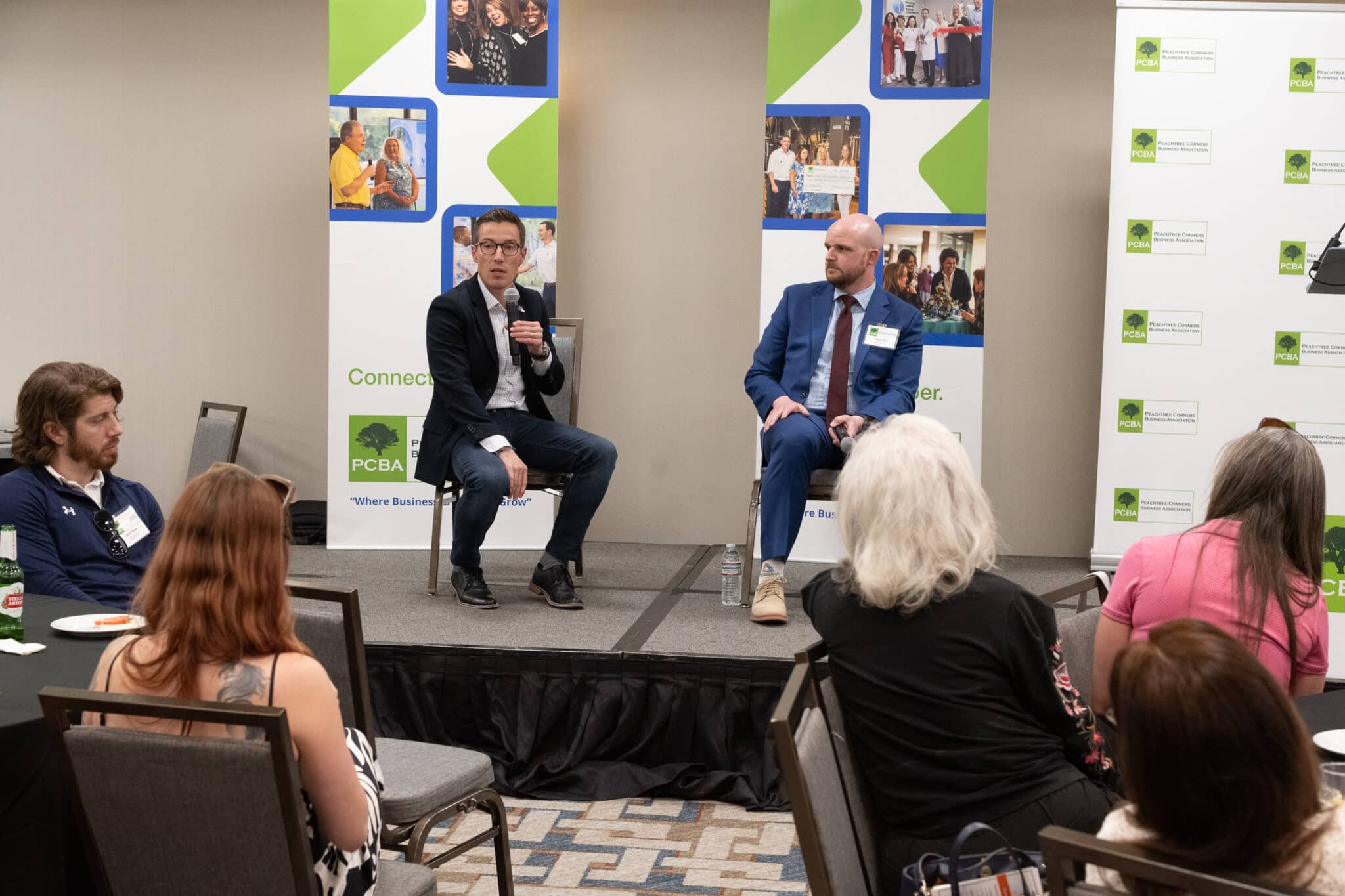
Most residents and business owners in Peachtree Corners probably think they know all about the economic development and strategic planning of Peachtree Corners, but do they really?
Peachtree Corners Business Association invited Peachtree Corners Economic Development Director Betrand Lapoire and Partnership Gwinnett Director of Economic Development Andrew Hickey to its After Hours Speaker Series on March 27 to discuss the city’s growth from a 1971 master plan to a bustling city with 42,000 inhabitants and 40,000 jobs.
Key points included the importance of business retention and expansion, with 24 projects last year creating 1,600 retained jobs, 1,600 new jobs and $250 million in new capital investment.
The Curiosity Lab, a world-class innovation center, was emphasized as a significant attraction. The city’s zoning and infrastructure plans were also discussed, focusing on balancing office and residential development to maintain a vibrant, sustainable community.
Matching jobs to residents
Although Peachtree Corners is just a teenager in terms of being an incorporated city, the foundation for this vibrant, fast-paced economic hub was laid more than 50 years ago by technology pioneer Paul Duke.
“Peachtree Corners was the first master-planned, business innovation technology park in metro Atlanta,” said Lapoire. “It was in response to the brain drain of technology with Georgia Tech graduates leaving the area.”
While the city may have a small-town feel, it’s the largest in Gwinnett County by population, but not land mass, he added.
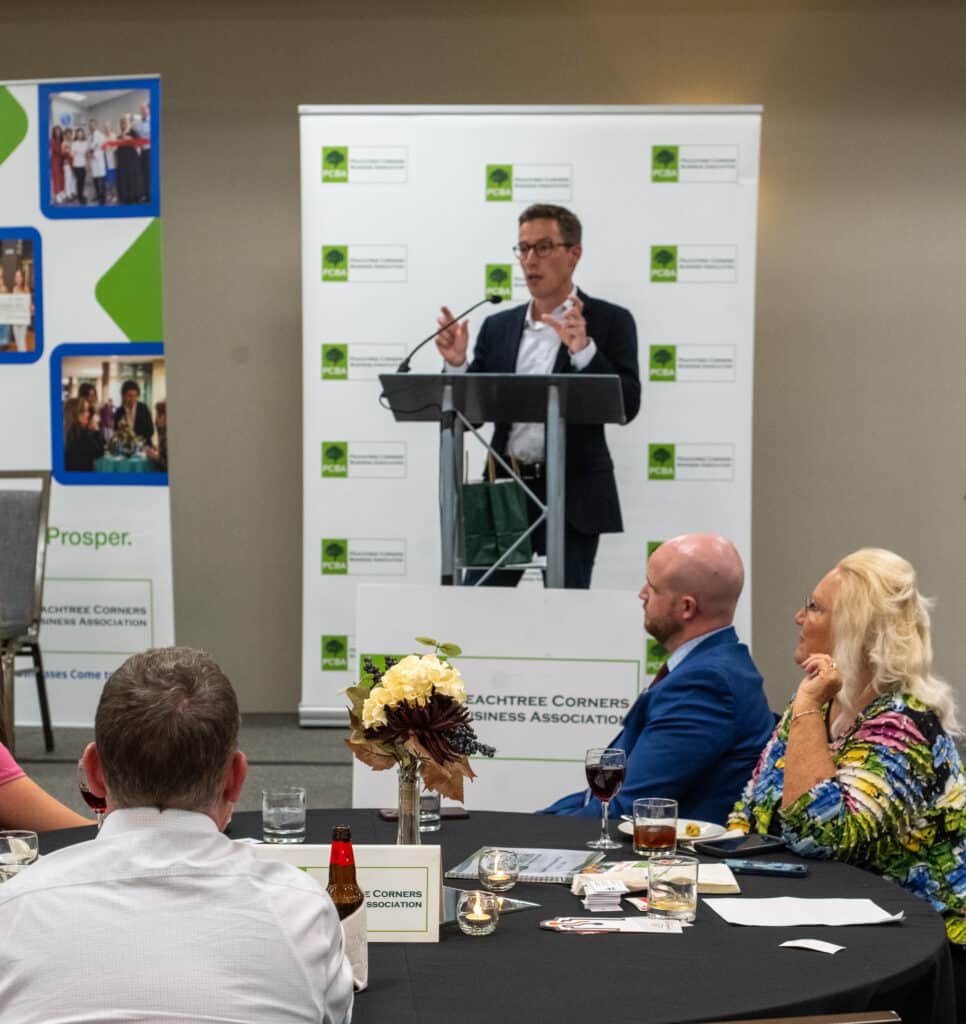
“The city started from a commercial, industrial, R&D base and then was expanded around it,” said Lapoire.
Though home to more than 42,000 residents, most of the jobs in Peachtree Corners are filled by people who live outside the city, he added.
“So we have this interesting mismatch, in a way, although not unusual,” said LaPoire. That creates traffic and transit issues. So that means that one of the solutions is to create more jobs here to fit the profile of the community.”
He presented charts that show professional services, consulting and engineering as the largest job categories. The next tier of businesses are wholesale and manufacturing.
“So we have a good mix of industry,” he said.
A five-year plan
The city has a five-year economic development plan (2023-2028) that outlines strategies for attracting and retaining businesses, with education and workforce development being key components.
Partnership Gwinnett has similar goals as Peachtree Corners, but on a larger scale.
“We are the county’s sales and marketing arm for all 17 cities now, and we receive funding from both municipal sources as well as existing businesses here — both in Gwinnett and outside of Gwinnett as well,” said Hickey.
He shared how Partnership Gwinnett is designed to drive a lot of major corporations toward doing business inside and with Gwinnett County.
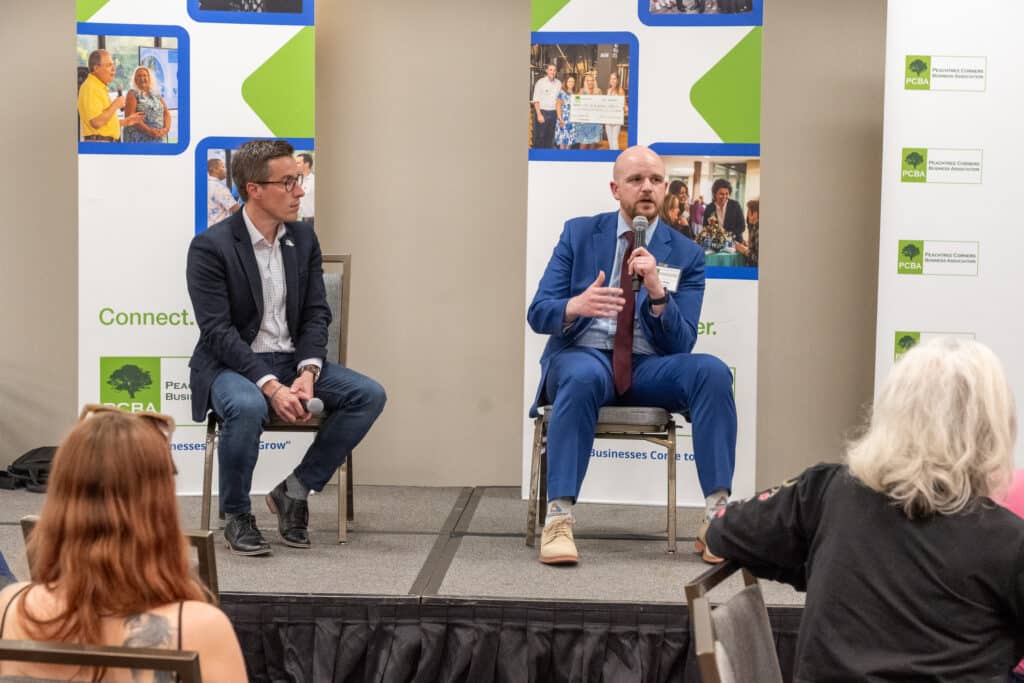
“One of the biggest things that we talk about that I’m sure it seems like most of us here, if you live here, you work here, you understand it. It’s the diversity that exists here in Gwinnett,” he said. “With a diversity index of 85, that means if we walk out of the Hilton here and we say hello to somebody, there’s an 85% chance they’re from a different ethnic or cultural background than ourselves, which to you and I may seem normal because that’s the life that we live in.”
He added that for companies, there’s a tremendous value in that, whether they have stated values, or they’re just making hiring decisions to get a wide range of candidates to fill those roles. Additionally, because of the proximity to Atlanta, Gwinnett County has a great labor draw.
Partnership Gwinnett
Partnership Gwinnett plays a significant role in recruiting businesses, expanding existing companies and developing the workforce. Hickey showed how the organization was involved with more than 24 projects last year.
“A majority of those were expansions, and that is a common thread you’ll see in economic development,” he said. “In business retention, expansion is so vital to working with our existing companies to make sure that they have the resources they need.”
He added that’s what leads to new investment and job creation in the community.
The organization also focuses on redevelopment projects, working with cities and the county to improve infrastructure and community amenities — especially strong educational institutions such Georgia Gwinnett College, Philadelphia College of Osteopathic Medicine and others.
Quality of life
In closing, both men stressed the importance of recruiting companies and developing the workforce, along with one aspect that means a lot but may not be as obvious — quality of life.
“It’s definitely evident that people like to work where they live — the whole live, work play experience,” said Hickey. “I joke that the part that people really have the most questions about, and are most excited to learn about, is new events at The Forum or Gwinnett Place Mall.”
Although they want to know what’s the next major company coming to Gwinnett, people REALLY want to know about how to spend their leisure time.
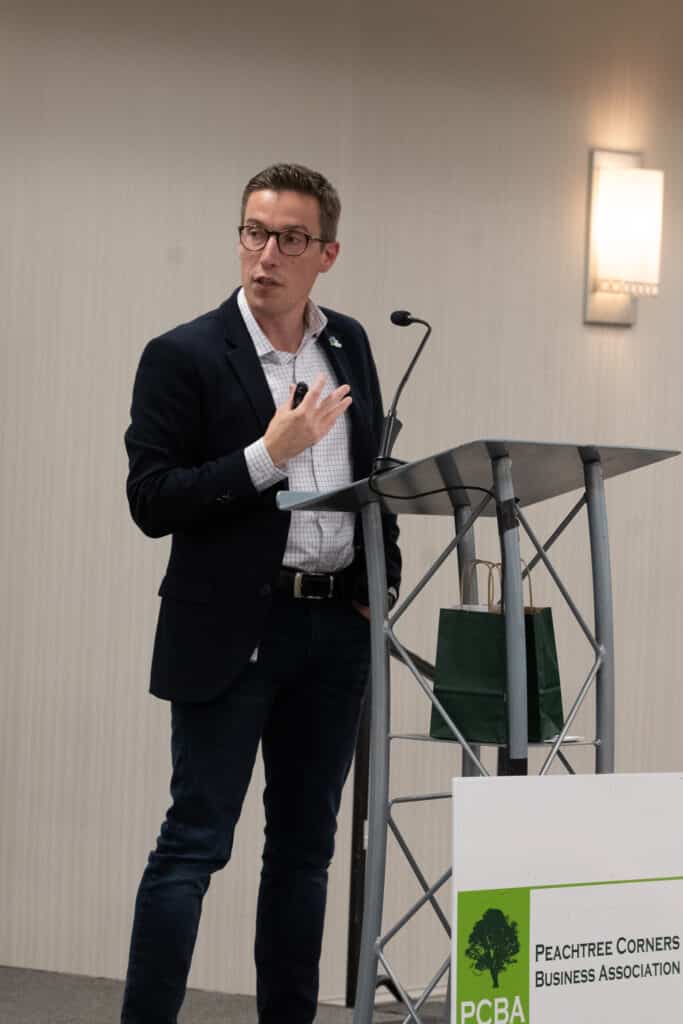
“That speaks to the importance of ensuring that we have a great community,” he said. “So at Partnership Gwinnett we work with all of our cities, and the county government as well, [on] a kind of a best-practices trip.”
He added that the peer tour allows everyone to know what the neighboring communities are doing and share the good news.
“We will take all of these elected officials, but also city staff, to different cities across the Southeast,” he said. “Last year, I believe they went to Huntsville, and have been to Greenville, Chattanooga — all cities that have done some really cool redevelopments that have taken their city to the next level. Our goal is to learn from them.”
Related
Business
Two Peachtree Corners Business Leaders Named Finalists for EY Entrepreneur Award
Published
2 weeks agoon
April 23, 2025
Ernst & Young’s Entrepreneur Of The Year celebrates ambitious entrepreneurs who are shaping the future
Ernst & Young LLP (EY US) recently announced the finalists for the prestigious Entrepreneur Of The Year 2025 Southeast Award, and two local, Peachtree Corners business leaders — David Quirk, president and CEO of DLB Associates Consulting Engineers PC and Erin Hanson, founder and CEO of Guardian Sports — made the list.
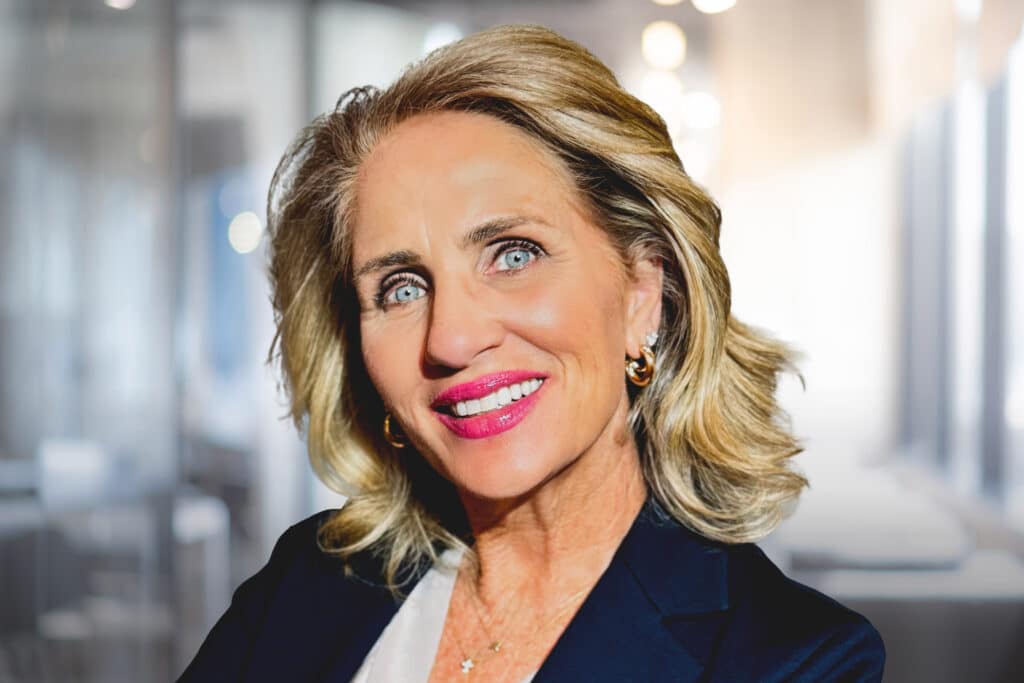
Hanson’s Guardian Sports is a family-owned company dedicated to serving athletes through safety and performance improvements in sports equipment. Major products include the Guardian Cap, PEARL ball and Guardian Infill serving the sports industry.
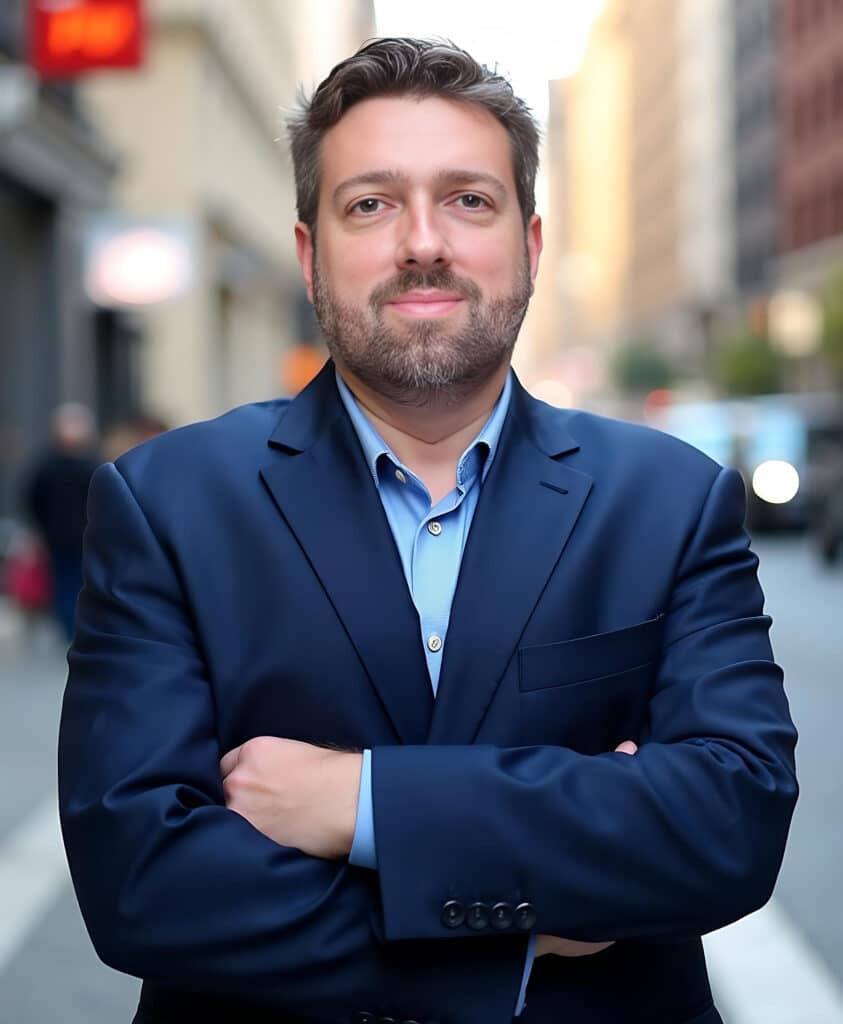
DLB Associates is a U.S.-based consulting engineering firm specializing in mission-critical and complex built environments. With more than 40 years of expertise, DLB delivers innovative, technology-driven solutions in engineering, commissioning and operations worldwide.
Celebrating entrepreneurial leaders
Now in its 40th year, Entrepreneur Of The Year recognizes the bold leaders who disrupt markets through the world’s most ground-breaking companies, revolutionizing industries and making a profound impact on communities. The program honors those entrepreneurs whose innovations shape the future and pave the way for a thriving economy and a hopeful tomorrow.
The Southeast program celebrates entrepreneurs from Alabama, Georgia, North Carolina, South Carolina and Tennessee.
An independent panel of judges selected 36 finalists for their entrepreneurial spirit, purpose, growth and lasting impact in building long-term value.
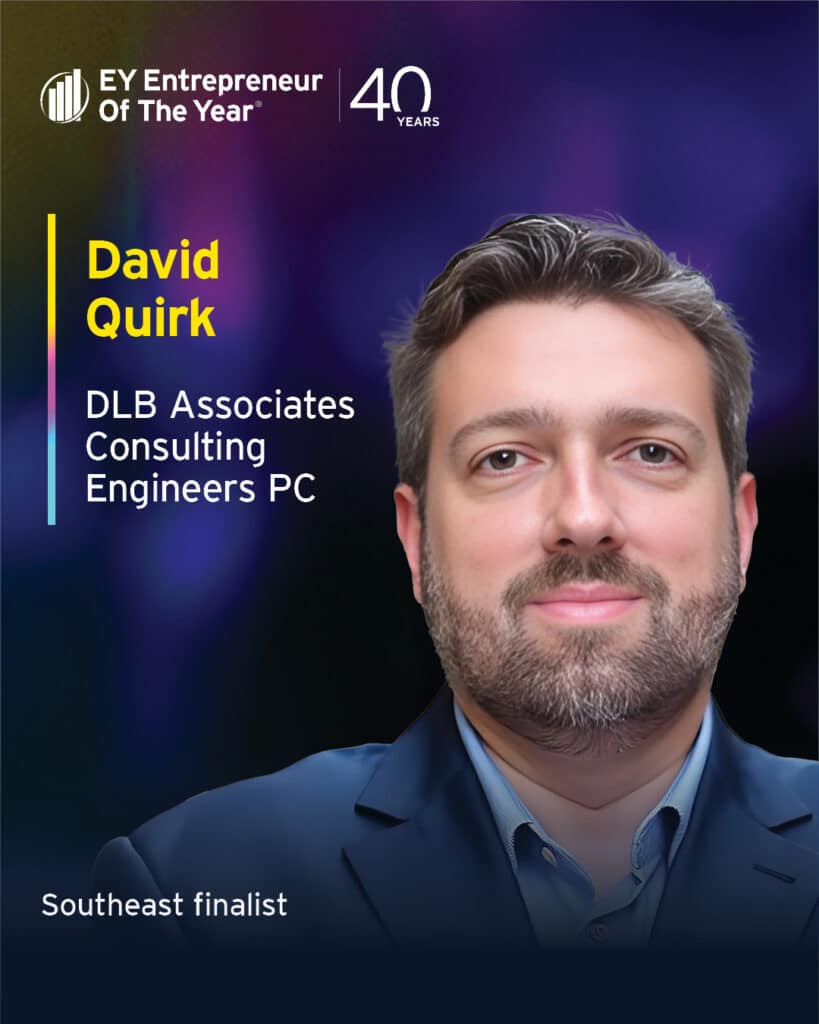

“This year’s finalists are leading examples of innovation, perseverance and resilience, illuminating paths to a brighter future for their industries and communities,” said Chevy Arnold, Entrepreneur Of The Year Southeast Program co-director.
“Their commitment to excellence transforms challenges into opportunities, inspiring us all,” added Kimberly Kicklighter, Entrepreneur Of The Year Southeast Program co-director.
Entrepreneur Of The Year honors many different types of business leaders for their ingenuity, courage and entrepreneurial spirit.
The program showcases original founders who bootstrapped their business from inception or who raised outside capital to grow their company; transformational CEOs who infused innovation into an existing organization to catapult its trajectory; and multigenerational family business leaders who reimagined a legacy business model to strengthen it for the future.
Including Quirk and Hanson, the 2025 Southeast finalists are:
- Marc Hodulich | 29029 | Atlanta, Georgia
- Damon Stafford | Alpine Intel | Charlotte, North Carolina
- Lou Hensley | Aspida | Durham, North Carolina
- Matthew Dent | Buffalo Rock Company | Birmingham, Alabama
- Melanie Little | Colonial Pipeline Company | Alpharetta, Georgia
- Will Bartholomew | D1 Training | Franklin, Tennessee
- Rene Diaz | Diaz Foods | Atlanta, Georgia
- David Quirk | DLB Associates Consulting Engineers PC | Peachtree Corners, Georgia
- Markus Scott | EyeQ Monitoring | Atlanta, Georgia
- Jon Gosier | FilmHedge | Atlanta, Georgia
- John Fitzpatrick | Force Marketing | Atlanta, Georgia
- Dr. Barry Patel | Galt Companies | Atlanta, Georgia
- Dr. Wade Smith | Galt Companies | Atlanta, Georgia
- Charles Gillespie | Gambling.com Group | Charlotte, North Carolina
- Kevin McCrystle | Gambling.com Group | Charlotte, North Carolina
- Mike Griffin | Griffin Brothers Companies | Cornelius, North Carolina
- Erin Hanson | Guardian Sports | Peachtree Corners, Georgia
- Dan Beem | Hissho Sushi | Charlotte, North Carolina
- Aaron Siegel | Home Team BBQ | Charleston, South Carolina
- Marc Murphy | Ignite Digital Services | Charleston, South Carolina
- Miller Chalk | Inglett & Stubbs, LLC | Mableton, Georgia
- Liza Rodewald | Instant Teams | Southern Pines, North Carolina
- Stephen Andresen | McClancy Foods & Flavors | Fort Mill, South Carolina
- Travis LeFever | Mission Mobile Medical Group | Greensboro, North Carolina
- Cyrus Mojdehi | Northway Homes | Charlotte, North Carolina
- Connor Ryan | NutraSky | Alpharetta, Georgia
- Fritz Owens | OTR Solutions | Roswell, Georgia
- Christopher Chuang | Relay, Inc. | Raleigh, North Carolina
- Kurt Jacobus | restor3d, Inc. | Durham, North Carolina
- Tom Kendrot | Shearwater Health | Nashville, Tennessee
- Teak Shore | Southern Lighting Source | Cumberland, Georgia
- Cindy Eckert | Sprout Pharmaceuticals | Raleigh, North Carolina
- Bryan Moore | TalkShopLive Inc. | Nashville, Tennessee
- Tina Moore | TalkShopLive Inc. | Nashville, Tennessee
- Igor Marinelli | Tractian | Atlanta, Georgia
- Joan Butters | Xsolis | Franklin, Tennessee
You can learn more about the finalists at ey.com/en_us/entrepreneur-of-the-year-us/southeast/winners-finalists.
Regional award winners will be announced on June 25 during a special celebration. The winners will then be considered by the national independent panel of judges for the Entrepreneur Of The Year National Awards, which will be presented in November at the annual Strategic Growth Forum®, one of the nation’s most prestigious gatherings of high-growth, market-leading companies.
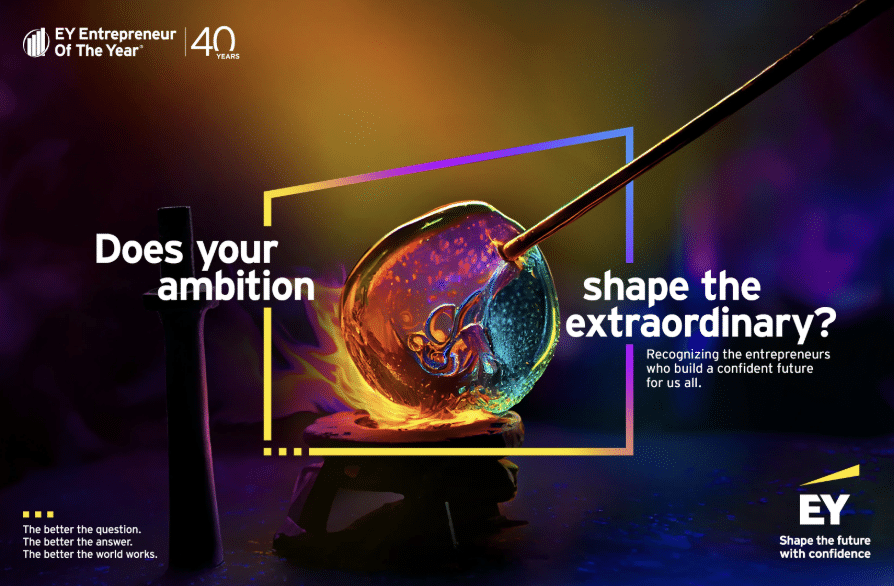
About Entrepreneur Of The Year
Founded in 1986, Entrepreneur Of The Year has celebrated more than 11,000 ambitious visionaries who are leading successful, dynamic businesses in the U.S., and it has since expanded to nearly 60 countries globally.
The U.S. program consists of 17 regional programs whose panels of independent judges select the regional award winners every June. Those winners compete for national recognition at the Strategic Growth Forum® in November where national finalists and award winners are announced.
The overall national winner represents the U.S. at the EY World Entrepreneur Of The Year™ competition.
For more about the award, visit ey.com/us/eoy.
Related
Business
SCB Construction Group Partners with CGA Reps on New Peachtree Corners HQ
Published
3 weeks agoon
April 15, 2025
SCB Construction Group, freshly rebranded from SteelCo, secures construction project with CGA Reps for new office HQ in Peachtree Corners
SCB Construction Group has announced a strategic partnership with CGA Reps to build a new office headquarters in Peachtree Corners. The project, encompassing approximately 26,000 square feet of innovative workspace, marks a significant milestone in advancing CGA Reps’ corporate vision while showcasing SBA Construction Group’s commitment to delivering transformative construction solutions.
In collaboration with Oakley Real Estate Partners — serving as developers of the project on behalf of CGA Reps — this venture reflects a united effort to bring cutting-edge design (from Smallwood architecture firm) and operational excellence to the commercial kitchen equipment industry.
The announcement follows several high-profile projects for SCB Construction Group in 2024, including a 72,500-square-foot manufacturing center and headquarters for Process Equipment & Controls, an impressive interior build-out for Courtesy Ford Conyers’ commercial service center and the Phase 1 completion for StoreEase Loganville — recently honored as a 2024 Smart Facility of the Year by Modern Storage Media.
A bold new chapter for CGA Reps
The new 25,890-square-foot headquarters is designed to be more than just a workplace — it is envisioned as an inspiring environment that serves both client engagements and employee creativity. CGA Reps is recognized as an industry expert in commercial kitchen equipment, representing leading manufacturers, warehousing, distributing and installing everything from fryers to commercial walk-in freezers.
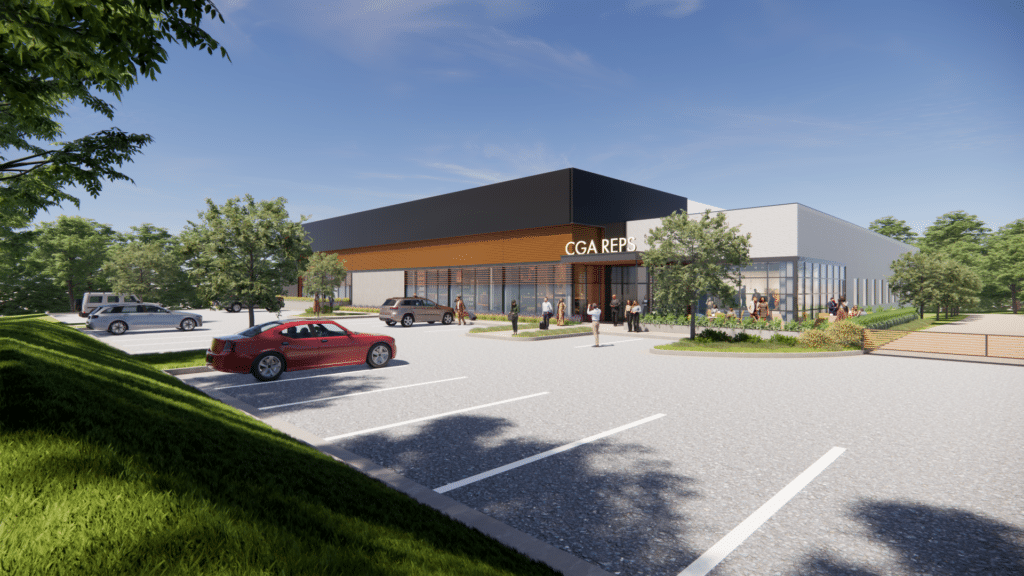
The facility’s design reflects this expertise, featuring a dedicated approximately 9,000-square-foot showroom kitchen that will host equipment demonstrations, tradeshows and webinars. This dynamic space will allow CGA Reps to showcase its comprehensive product range and provide clients with hands-on experiences of the latest commercial kitchen innovations.
A standout feature of the project is its innovative approach to stormwater management. With the site comprising only three acres, sufficient space for a traditional detention pond does not exist. To overcome this challenge, the design includes an underground detention system located beneath the truck court to efficiently handle all stormwater runoff.
This solution not only maximizes the use of the available land but also reinforces CGA Reps’ commitment to sustainable practices.
“We are excited to embark on this project with CGA Reps,” said Jay Bailey, CEO of SCB Construction Group. “This partnership underscores our commitment to customer excellence in design and construction, and it is a testament to the trust our clients place in our ability to deliver projects that not only meet but exceed expectations.”
Delivering excellence through proven expertise
SCB Construction Group’s track record in 2024 has been nothing short of remarkable. Earlier in the year, the company completed a 72,500 square foot manufacturing center for Process Equipment & Controls, integrating office space within a dynamic production facility.
This project was celebrated for its innovative design that balanced operational efficiency with a modern aesthetic, utilizing IMP panels to mimic tilt-up concrete, setting new standards for manufacturing environments.
Similarly, the interior build-out for Courtesy Ford Conyers’ commercial service center demonstrated SCB Construction Group’s ability to transform conventional spaces into functional and attractive environments that cater to both customer and staff needs.
The company’s commitment to quality and precision was again evident in the successful Phase 1 completion for StoreEase Loganville. This project, which recently earned the distinction of a 2024 Smart Facility of the Year by Modern Storage Media, highlights SCB Construction Group’s forward-thinking approach to construction and design, incorporating smart technologies and design that enhance sustainability and operational efficiency.
A rebranding that reflects a vision for the future
In a move that signals its evolution and growth, SCB Construction Group has recently rebranded from its former identity, SteelCo Buildings, as it spins off its construction division. This strategic rebranding is not merely cosmetic — it represents a renewed commitment to capabilities, credibility and client-focused service.
The refreshed brand is anchored by a new tagline “Deep Expertise, High Expectations” and a clear brand promise that communicates the company’s mission: to craft exceptional construction experiences based on precision, innovation and trust.
“Our rebranding is about more than just a new name or logo; it’s a renewed promise to our clients and communities,” explained Robert Lee, marketing director at SCB Construction Group. “We believe that our updated brand identity, including our invigorated tagline and mission statement, encapsulates our dedication to pushing the boundaries of design and construction. It reflects our commitment to creating spaces that are as inspiring as they are functional.”
Transforming spaces to inspire and connect
The new headquarters for CGA Reps is expected to become a landmark facility in Peachtree Corners. Beyond its impressive architectural design and advanced construction techniques, the building is planned as a hub for innovation and collaboration.
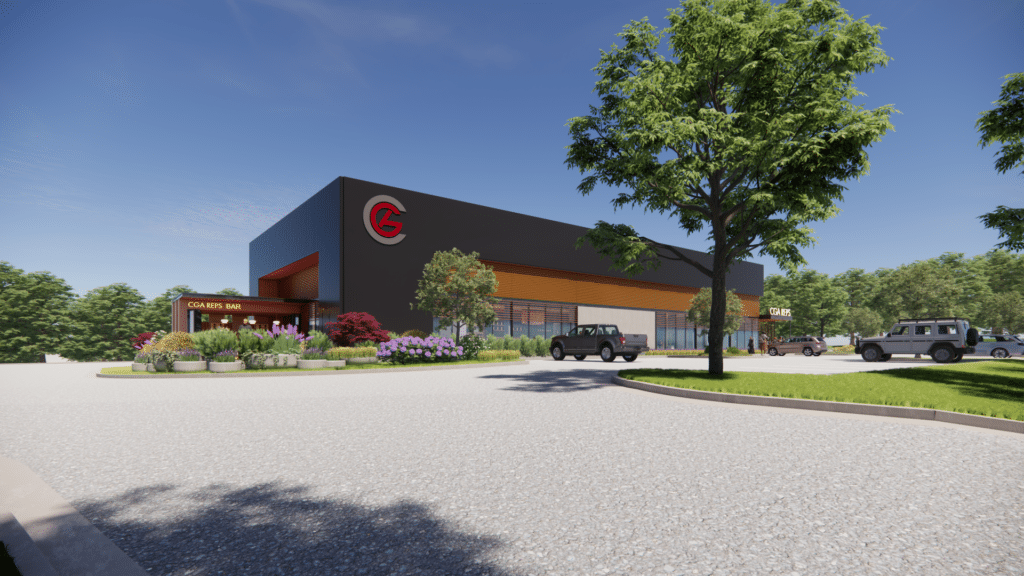
The interior build-out will include dynamic client reception areas, interactive meeting rooms, and dedicated spaces designed to foster creativity and teamwork among employees. The layout is crafted to ensure that every area of the facility contributes to a productive and inspiring work environment.
“By investing in this state-of-the-art facility, CGA Reps is making a strong statement about the future of work,” said Bryan Young, VP of construction at SCB Construction Group. “Our team is dedicated to designing and building spaces that not only serve the immediate needs of our clients but also create environments that motivate and inspire. The new headquarters will be a testament to that vision.”
Looking ahead
The partnership between SCB Construction Group and CGA Reps marks a significant step forward for both companies. As SCB Construction Group continues to build on its legacy of excellence and innovation, this project is poised to set a new benchmark for modern office headquarters design in the region.
With a strategic focus on creating spaces that inspire, connect and drive success, the future looks promising for both SCB Construction Group and its esteemed partner, CGA Reps.
For more information on the new headquarters project or to learn more about SCB Construction Group’s portfolio, visit scbcg.com.
Related
Read the Digital Edition
Subscribe
Keep Up With Peachtree Corners News
Join our mailing list to receive the latest news and updates from our team.
You have Successfully Subscribed!

Katherine Lafourcade — A Journey of Passion, Resilience and Giving Back

GA Tech Launches First-of-its-Kind GT Atrium in Peachtree Corners

Digital Edition

PCBA Announces 2025 Scholarship Winner

Paul Duke STEM High School Student Earns CGO Scholarship

World Blood Donor Day Starts Here: Theo’s Miracle, Katherine’s Mission [Podcast]

Official City Merchandise Line Debuts This Saturday at Town Green

Peachtree Corners Grows Business Opportunities Through Economic Development

City of Peachtree Corners Awarded Certificate of Achievement From GFOA for Seventh Straight Year

Simpson Elementary Marks Exceptional Children’s Week

Executive Function: A Tribute to Working Moms

Official City Merchandise Line Debuts This Saturday at Town Green

Peachtree Corners Grows Business Opportunities Through Economic Development

Digital Edition

World Blood Donor Day Starts Here: Theo’s Miracle, Katherine’s Mission [Podcast]

Paul Duke STEM High School Student Earns CGO Scholarship

Light up the Corners [Video]

Capitalist Sage: Business Leadership in Your Community [Podcast]

Cliff Bramble: A Culinary Adventure through Italy

Top 10 Brunch Places in Gwinnett County

A Hunger for Hospitality

THE CORNERS EPISODE 3 – BLAXICAN PART 1

Top 10 Indoor Things To Do This Winter

The ED Hour: What it takes to Remove Barriers from Education

Peachtree Corners Life
Topics and Categories
Trending
-
Digital Edition5 days ago
Digital Edition
-
Podcast5 days ago
World Blood Donor Day Starts Here: Theo’s Miracle, Katherine’s Mission [Podcast]
-
City of Peachtree Corners3 days ago
Official City Merchandise Line Debuts This Saturday at Town Green
-
Business3 days ago
Peachtree Corners Grows Business Opportunities Through Economic Development






